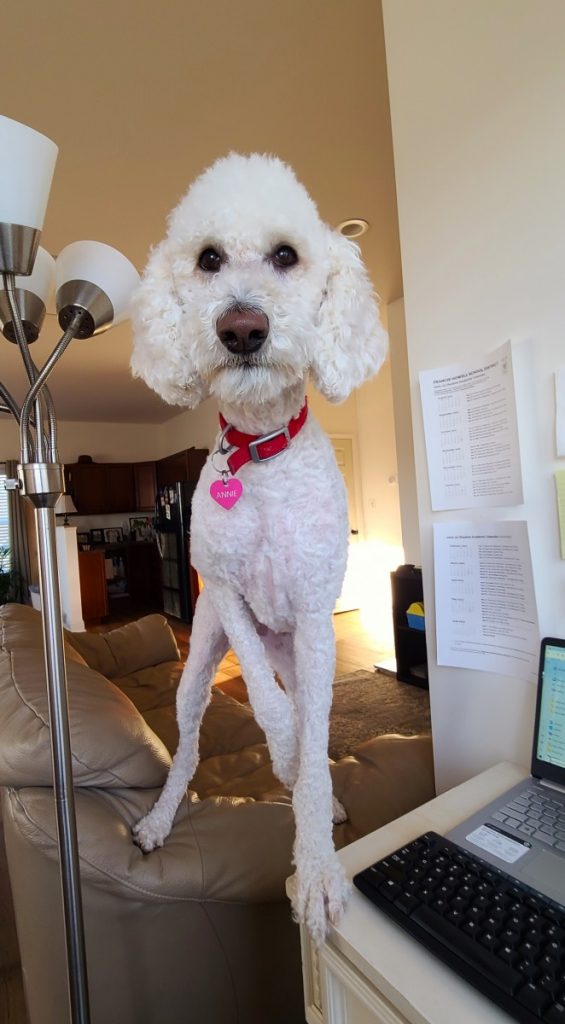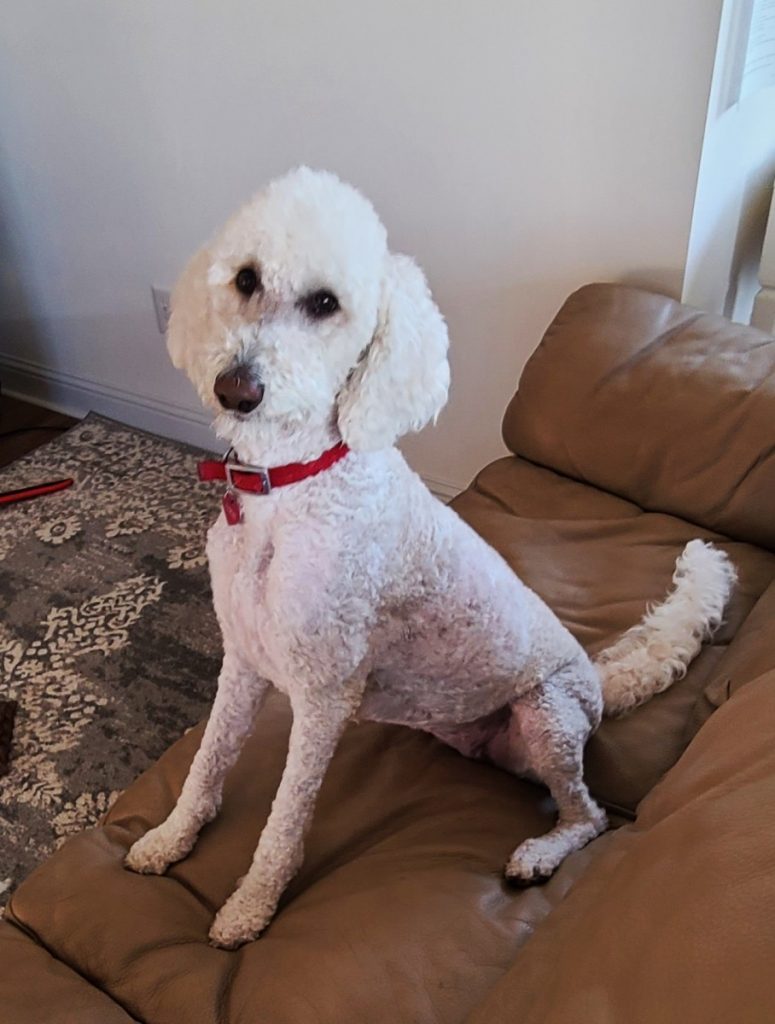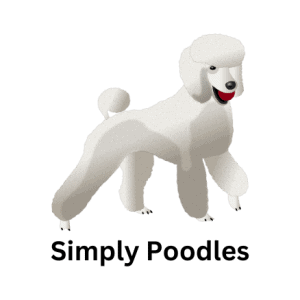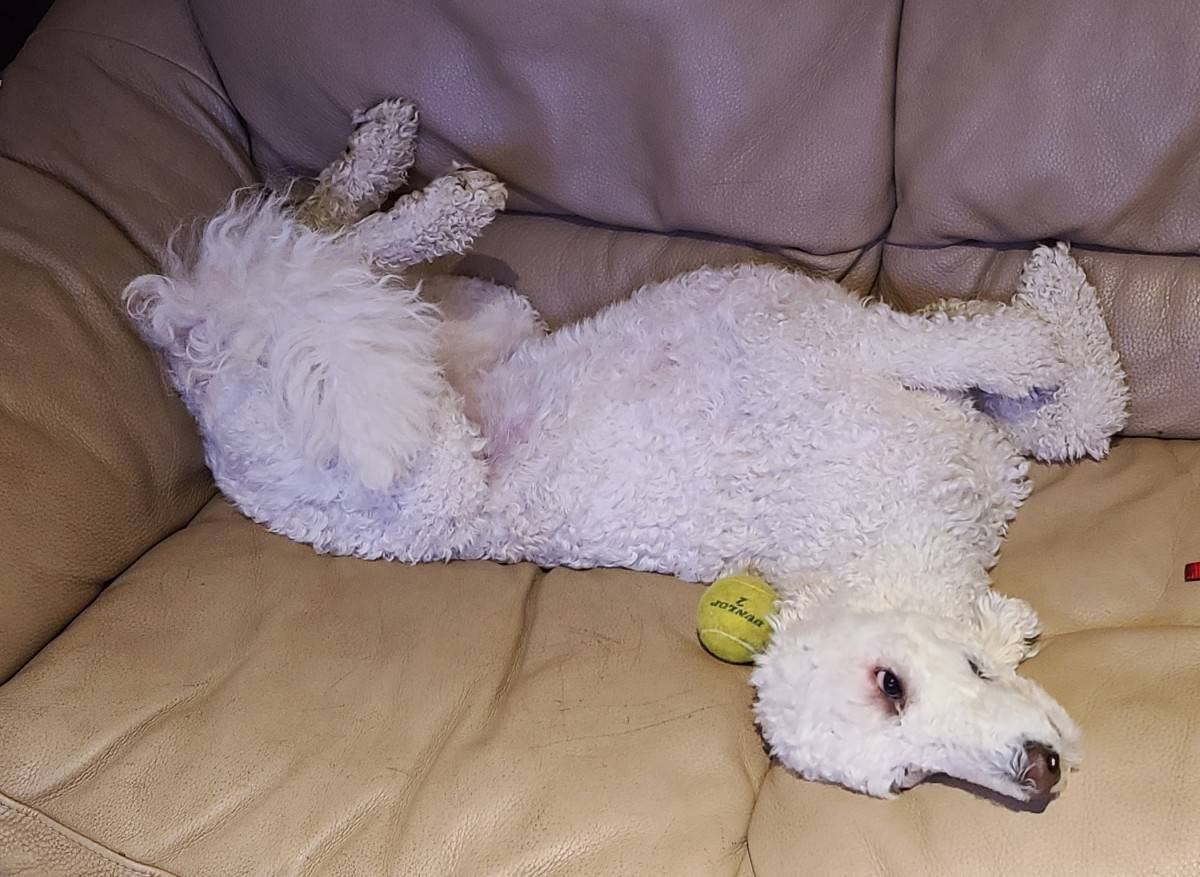The stylish, smart, comical Poodle has been a top ten favorite dog for many years. You may be thinking about getting a Poodle or maybe you already have one. Something important to consider, “How long do Poodles live?”
Poodles live an average of 12 to 15 years of age. Since Poodles come in 3 sizes the size of the Poodle can affect their lifespan as smaller dogs tend to live longer lives than big dogs.
In this article we’ll discuss the specific lifespan of the Standard Poodle, the Miniature Poodle, and the Toy Poodle. We’ll also talk about proven ways to help your Poodle live longer. Let’s dive in!

Annie watching me write this article. She wants to play! 
Annie posing on the sofa!
Poodle Lifespan According to Size
As mentioned earlier Poodles come in three sizes as recognized by the American Kennel Club (AKC) and include the Standard Poodle, the Miniature Poodle, and the Toy Poodle. We’ll explore each size and their lifespan below.
- Standard Poodles – The largest size of the Poodles, the Standard Poodle average size is 22″ at the shoulders but they can be as short as 15″ tall. Standard Poodles fall in the weight range between 45 and 70 pounds with females topping out around 60 pounds and males topping out around 70 pounds. The Standard Poodle, being the largest poodle, typically has a lifespan of around 12 years. Some Standard Poodles may only live around 10 years while others may live as long as 15 years.
- Miniature Poodles – The medium size Poodle referred to as the Miniature Poodle is from 11 inches to 15 inches tall at the shoulders and weighs on average from 15 to 17 pounds. The Miniature Poodle will usually live around 15 years and fall within a range of 14 to 17 years.
- Toy Poodles – the smallest of the Poodles, the tiny Toy Poodle, is 10 inches tall and under at the shoulders and only weighs 6 to 9 pounds. Toy Poodles typically live about 16 years with a range of 14 to 18 years. So, like other dog breeds, the smaller Poodles typically live the longest.
Why Do Small Poodles Live Longer Than Big Poodles?
Owners of small Poodles can expect to enjoy several more years with their pets than the owners of large Poodles. According to the American Kennel Club this is the conclusion of a study by Dr. Silvan Urfer, University of Washington. In his study, Dr. Urfer discovered small dogs had a median lifespan of 14.95 years, medium size dogs had a median lifespan of 13,86 years, and large dogs lived 13.38 years.
This is a bit puzzling since large animals such as whales and elephants live longer than small animals, for example, mice. This fact has been a mystery to scientists for many years. Now comes Dr. Urfer with extensive research on the lifespan of dogs in respect to their size.
The size of the dog was the primary and most important variable to predict the lifespan of dogs. Dr Silvan Urfer collected data from U. S. Veterinary hospitals over a 3 year period. The study included information on over 2 million dogs which is quite astounding.
The study confirmed that small body size within a species usually lives a longer life and ages more slowly. Obviously, the dog species come in a huge size range which also proves this theory.
The specific reason the small dogs live longer than large dogs was discovered by Cornelia Kraus, a biologist at the University of Gottingen in Germany. She was the lead researcher in a study of 56,000 dogs which included 74 breeds seen in North American veterinary teaching hospitals.
Dr Kraus concluded that since large dogs grow faster than small dogs they tend to have abnormal cell growth related to cancer. Large breed dogs died more often from cancer than their smaller counterparts. Also, as they age faster the large dog breeds have age related illnesses sooner.
Dr Urfer also discovered that annual dental cleanings by a veterinarian reduced the risk of death by close to 20 percent. The study also concluded there could be a direct association between good dental care and good overall health.
Dental Health in Poodles
According to the American Veterinary Medical Association your Poodle’s teeth should be checked once a year by a veterinarian to look for early signs of dental issues and to maintain your dog’s dental health. Your veterinarian will look for any of the following signs which could indicate dental issues:
- Swelling in the areas surrounding the mouth
- Bleeding from the mouth
- Abnormal drooling, chewing, or dropping food from the mouth
- Pain inside and around the mouth
- Refusal to eat or reduced appetite
- Discolored teeth or teeth covered in tartar
- Retained baby teeth or extra teeth
- Loose or broken teeth
- Bad breath
If your Poodle has suddenly become irritable or has exhibited a change in behavior it could be dental issues. Your veterinarian could detect what is causing the discomfort in your Poodle and a quick visit is advised.
Some Causes of Dental Problems in Poodles
Dogs (Poodles included!) tend to have many of the same dental problems that people develop as seen in the following:
- Defects of the Palate – for example, cleft palate
- Broken jaw
- Misalignment of the teeth and bite
- Tumors or cysts in the mouth
- Infected teeth or abscesses
- Periodontal disease
- Broken teeth and roots
The most common dental condition in dogs is gum disease, also known as periodontal disease. Most dogs will have some early evidence of periodontal disease by the time they are 3 years old. Since advanced periodontal disease can cause severe pain for you Poodle early detection and treatment are very important.
Typically your veterinarian will thoroughly clean your dogs teeth and may take x-rays to determine how severe the disease is. At this point the veterinarian would develop a treatment plan depending on the results of the exam.
How Does Obesity Affect Longevity in Poodles?
According to Deborah Linder, DVM, DACVN, Tufts University, 34 percent of adult dogs in the United States are obese or overweight. This is a huge concern as research by Alexander James German, BVSc(Hons), PhD indicates that healthy weight dogs live 2 years longer than obese dogs.
Obesity in dogs puts extra stress on the musculoskeletal system which leads to intervertebral disc disease and osteoarthritis. This extra weight also increases dogs risk of developing pancreatitis and diabetes. Obesity can cause respiratory and cardiac conditions such as tracheal collapse and airway dysfunction.
The results of obesity is motivation to help keep your Poodle at a healthy weight which improves her quality of life and reduces her odds of developing weight related diseases. Plus, living at a healthy weight gives her a better chance to live a full, longer, happier life with you.
7 Ways to Help Your Poodle Live Years Longer
First, this is by far the most important way to help your Poodle live longer: Feed your dog less food than recommended: According to this Cambridge University Study in 2007 covering 20 years of data, DOGS THAT ATE 25% LESS FOOD LIVED ALMOST 2 YEARS LONGER THAN THEIR COUNTERPARTS. This is significant!! The same diet was fed to all dogs, only the quantity differed. Other subsequent studies confirmed this data.
Certainly for some people feeding your Poodle 25% less may be a challenging task and it may seem to be a bit heartless. Other Poodle owners may have a picky eater, like my Standard Poodle Annie. Having your Poodle eat 25% less will not be as challenging. In fact, my challenge with her is to make sure she eats enough food.
Second, give your Poodle a healthy, high quality diet. This can be from a bag, a can, or homemade. You’ll want to avoid excess sugar, sodium, and meat byproducts. The best dog foods include whole ingredients. Ask your veterinarian about the best food for your Poodle.
Third, be aware of dog food recalls. For FDA dog food recalls visit: FDA.gov (Be sure and scroll down the page). The FDA gives typically gives timely updates on recalled dog food.
Fourth, prepare for potential accidents. For example, learn how to perform the Heimlich maneuver on your Poodle if she is choking. Here is an excellent guide to learn the Heimlich maneuver on your Poodle or any dog at petmd.com. It is also a good idea to save the contact information for the nearest 24 hour veterinary emergency room. Hopefully it will never be needed.
Fifth, practice preventative care. Make it a point to take your Poodle to the veterinarian and to the groomer for regular visits. Your vet will have a history of your dog and can potentially catch medical issues before they become worse. It’s important that the veterinarian clean your dog’s teeth once a year. Also, an observant groomer will take notice if something is not right with your dog.
Sixth, Exercise! Exercise is an important part of keeping your dog healthy. (It’s good for humans, too.) Exercise increases endorphins which lifts moods in dogs and people alike. Regular exercise helps in weight management and improves heart health. Exercise improves the quality of sleep. Among other benefits, exercise is fun for your Poodle!
Seventh, provide your Poodle with mental stimulation. Teach your dog basic commands such as sit, stay, and shake hands. Even short training sessions can help keep your dog’s brain sharp. Plus, Poodles like a challenge! There are many “dog brain toys” available today and some even claim to help your dog learn to talk! I haven’t tried the “teach your dog to talk toys” yet but I probably will someday.
History of the Poodle: Where Did They Originate?
Standard Poodles were originally bred as retrieving water dogs over 400 years ago. There is still some discussion whether they originated in France or Germany while most information indicates they originated in Germany. Although the Poodle is the national dog of France the name Poodle is derived from the German word ‘Pudelin’, which means ‘splashing water’. The French word for Poodle is ‘Caniche’. The athletic Poodle is believed to originally be a mix between the Barbet and the Hungarian water hound.
Standard Poodles were later bred down to the miniature and toy sized Poodles through selective breeding. Poodles became very popular with the French royalty in the 17th century.
The American Kennel Club recognized the Poodle as a breed in 1887. With their thick coat of hair, excellent swimming ability, and intelligence the Standard Poodle is an ideal retriever. The Standard Poodle is the only dog eligible for the AKC Retriever Hunting Test even though it is classified as a non sporting dog.
Poodle Popularity
The Poodle was ranked as the number one most popular dog in the United States from 1960 to 1982 according to registrations at the American Kennel Club. This was the longest continuous run of any breed.
Even though Poodles finally gave up the number one spot they still remain in the top 10 most popular dogs even today. In 2020 the Poodle ranked #7 in the AKC top 10 most popular dogs.
Famous Poodle Owners
According to the American Kennel Club there have been many famous Poodle owners. These include Katharine Hepburn, Walt Disney, Marilyn Monroe, Lucille Ball, Jackie Kennedy, Elizabeth Taylor, and Elvis Presley. In fact, Elvis was known to give Poodles to his girlfriends. I’m not sure if that was a great idea, Elvis.
King Louis XVI is was known to be very fond of toy poodles. The entire French royal court was known to be fond of poodles. The royal French court was most likely following the example set by King Louis XVI. After all, they wanted to make a good impression on their king!
Toy Poodles were given fancy haircuts and carried like trophies by French royalty. This is similar to Hollywood in the early 2000’s when toy poodles were being carried about in purses and special carriers and lived a pampered life!
Conclusion
Poodles live an average of 12 to 15 years depending on their size. By following the seven steps outlined above you can help your Poodle live a longer, healthier life. The most important step to extend your dog’s life is to avoid over feeding your Poodle. Being overweight can reduce your Poodles life up to 2 years. After all, we all want to enjoy our amazing little companions as long as possible. The popular Poodle is a wonderful companion and friend for many people and with a little extra care they can be enjoyed for many healthy, happy years.

